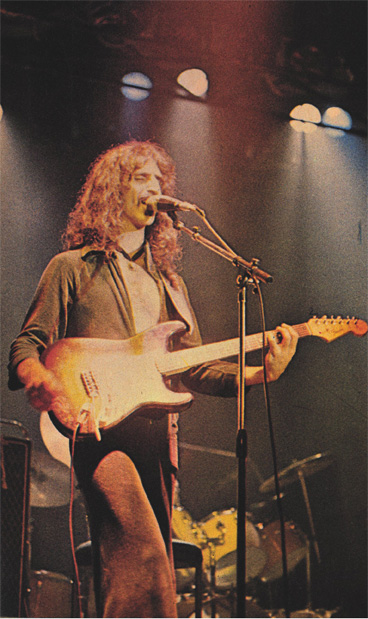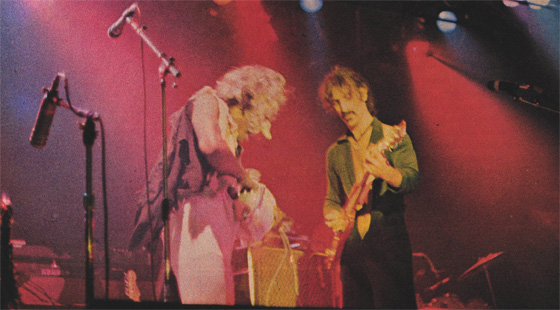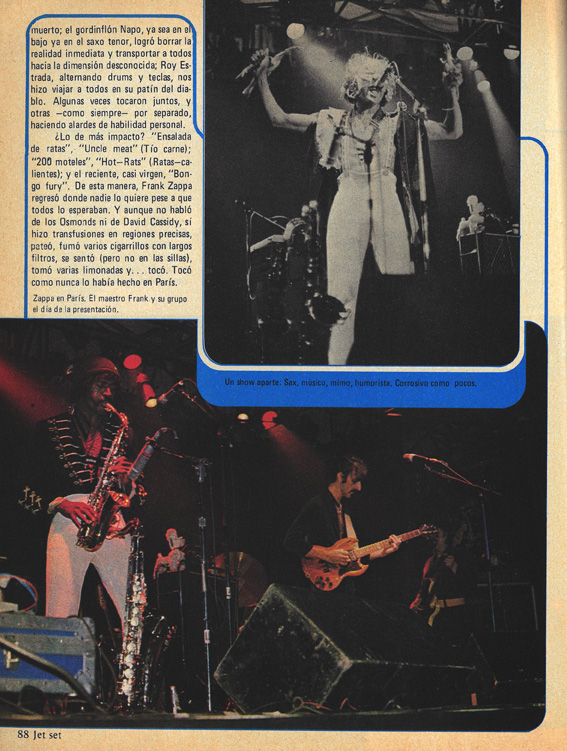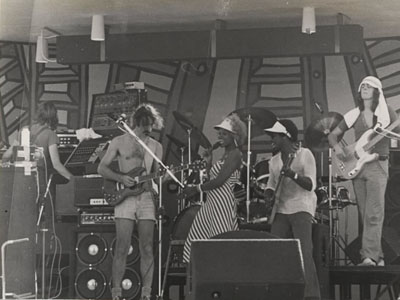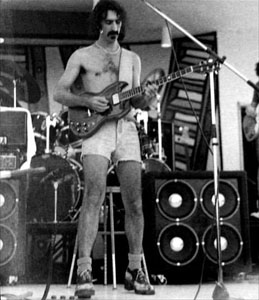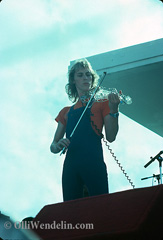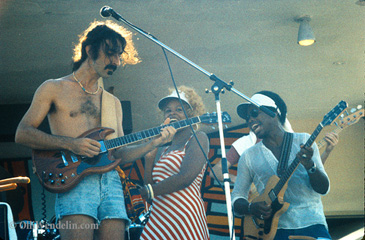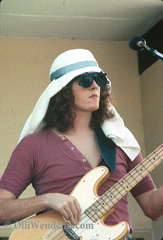May, 1976—FZ vs. Herb Cohen
Zappa recently dismissed his manager of 11 years, Herb Cohen, and that meant the dissolution of his own label, which Warner Brothers had distributed and his being absorbed directly into the Warner Brothers fold.
IT: Is Herb Cohen still your manager?
Z: No.
IT: What happened?
Z: I'm taking him to court. I worked with him for 11 years, but he made a couple of errors of judgment.
IT: Is there any bitterness?
Z: Oh yeah. Quite a bit.
IT: Who is your new manager?
Z: Bennett Glotzer. He used to manage Procol Harum, Janis Joplin, Blood Sweat And Tears.
Zomby Woof, Mother People #22, October, 1984, p. 10 (via Javier Marcote)
In mid May '76 Frank Zappa dissolved his 10 year partnersip with manager Herb Cohen, accusing Cohen's lawyer brother of staling money. This action resulted in a number of lawsuits between Zappa, Cohen and Warner Bros. (distributor of Bizarre, Straight and DiscReet records). Immediately Zappa was denied access to the DiscReet rehearsal hall, his library of films and rights to past albums, pending outcome of the suits. Most of these issues were resolved in 1982 when FZ got back his films and tapes. Bennet Glotzer became the new manager, and from this point on Frank Zappa would take on the increasing role of monitoring business affairs. From here on all albums and bands would be billed as Zappa.
Zappa is no longer associated with DiscReet and Herb Cohen, and he will make the big adios from Warner Brothers at the first available opportunity.
FOCUS: I've always admired your ability to work within one of the largest entertainment corporations in the world (Warner Bros.) and at the same time so effectively poke fun at the ones who run it and all they hold sacred. Do you actually have much dialogue with the executives of your record I company?
Zappa: "I do have dialogue with them, yes. I frequently tell them to kiss my ass. I also have good reasons for doing that, because the company doesn't do very much for me. It's sort of like pulling teeth to get them to make the records available. I argue with them a lot and I'll be delighted when I can get away from them."
FOCUS: How much time?
Zappa: "Anywhere from two minutes to two years, depending on certain events."
FOCUS: On how you feel?
Zappa: "No, on legal things."
Summer, 1976—The Power Trio
[After the European tour] I took a few weeks off and got a call from Frank, "I had to let Roy, Andre & Napoleon go, so it's just you and me again. Why don't you come down to the Record Plant and play on some stuff I've been working on."
[...] While we were in the studio he said he was thinking about hiring Eddie Jobson (of Roxy Music, Bryan Ferry & after FZ, UK) who we had met on the road and had jammed w/Frank backstage. This was the first inclination of what was going to be the new band.
I remember the depressed period where Frank told Pat O'Hearn and me, that he may not be able to pay us due to the legalities of the split [with Herb Cohen] having frozen him out from his financial assets. We of course being young, loyal and supportive offered to stay without pay until he had it sorted out. We were all grateful it naver came to that.
At one point, Frank, Terry, and I were just a trio. We jammed and played throughout the summer as such. Frank was producing a Grand Funk Railroad album at the time, and those guys would come in and encourage Frank to "revive the power trio." This was before the Police; the last trios had been Hendrix and Cream. We thought about that and actually rehearsed it for a while. But eventually Frank felt that he needed at least five guys to make things interesting.
I remember when Frank went through the lawsuit thing, he said he might not be able to pay us. We all said we we're willing to hang for a few months as long as the savings held out in the hopes that things would get better. And Frank was really depressed in that time. It was just me and Patrick O'Hearn and Eddie Jobson. And I was gonna be the sort of lead singer, and do the stuff that Napoleon did. It was a very strange time, you know. And then he got Ray White—we auditioned lots of singers.
Terry Bozzio, "Studio Tan," terrybozzio.com, c. 2002
I remember being in his basement with Pat O'Hearn and Eddie Jobson when things were really tough. His manager had miss-appropriated something like $40,000 and some parts of Franks personal P.A. system into a sound and lights/bus and truck company with out consulting him, and he said he didn't know if he could pay us that week. I recall saying that I had enough to last a month or so and not to worry about it, I wasn't going to leave or stop rehearsing, which he appreciated. Thanks to his creative financing it never came to that.
Zappa—The 1976-1977 Band
'Zappa'
Barry Miles, "Any Resemblance Is Purely Conceptual," New Musical Express, UK, December 4, 1976
Frank's new group is called 'Zappa'. He changed the name from The Mothers because "any resemblance between this group and the original Mothers Of Invention is purely conceptual. The kind of things we're doing now are very different."
OUI: Why is your group just called Zappa I now?
ZAPPA: Because it's not really the Mothers of Invention; so why call it the Mothers of Invention? Why be trapped in the Sixties? Know what I mean? It's a good name. Two syllables, not too taxing. It looks good in print and it happens to be my real name.
Bennett Glotzer
Zappa had to come up with a way to perform without being blocked by [Herb] Cohen. To get around Herb, Frank Zappa laid The Mothers Of Invention to rest and hit the road under his own name, and he had a new manager in tow—Bennett Glotzer, former manager of Blood, Sweat & Tears, Janis Joplin and Procol Harum.
Zappa claims he's confident with his choice of his third manager, Bennett Glotzer, although, he adds, "I've been wrong before. He really knows his work. He works real hard, he's got a good imagination for putting things together, doesn't sit still for a minute, and is a compulsive worker. I can get along with a guy like that."
Ruth Underwood
The latest Mothers are Zappa plus three, with Ruth Underwood a "possible" return. Their rock and roll event, "Night of the Iron Sausage," is due in September, with Terry Bozzio on drums, Eddie Jobson (Roxy Music) on violin and keyboards, and Patrick O'Hearn on bass while Zappa plays guitar, bass and keyboards. A U.S. tour is planned for the fall.
Flo & Eddie
Barry Miles, "Any Resemblance Is Purely Conceptual," New Musical Express, UK, December 4, 1976
Flo and Eddie auditioned for Frank's new group—they said that they couldn't stand paying out for their own group all the time—and Frank wanted them, but Columbia Records pressured them to take their own group on the road to promote their new album "Moving Targets".
During the tour, their guitarist Phil Reed fell from a hotel window and was killed. Flo and Eddie called Frank and asked if they could tag onto his tour. They did.
IT: Have you severed connections with Flo and Eddie?
Z: As a matter of fact they auditioned for this group.
IT: What happened—did they fail?
Z: Well they sort of passed, but they had just finished an album for Columbia and they wanted to go out and promote it, and they were considering whether or not it would be better promotion for their album to tour with me or touring with their own group. So they decided to tour with their own group. I still see them occasionally.
Eddie Jobson
[Eddie Jobson had] met Frank when Roxy Music supported the Mothers at a gig in Milwaukee in [November 28, 1975], when he'd sat in with one of his musical heroes. At the end of Roxy's American tour, he remained in Los Angeles and played with an early incarnation of Ritchie Blackmore's Rainbow. Then Frank invited him to accompany the Mothers on a week of Canadian gigs.
Jobson and Frank played together at sound checks and in dressing rooms as Frank assessed both his musical ability and his capacity to memorize arrangements. But he did get to play onstage at two shows. "He'd sort of say maybe five minutes before he was due onstage, 'It'd be nice if you played along tonight,'" he told Chris Salewicz. "You know, there's 10,000 people out there and he tells you like five minutes before and you just have to go on-stage and jam, really. I mean, he goes into a riff that you've never heard before in your life and just points at you and you have to do a solo. It was really good for me . . . I mean, that's his strength. He stretches his musicians beyond their capabilities all the time. And then when it comes to a performance he'll just relax it slightly to the point where people can actually play what he wants.'" [NME, August 21, 1976, "The Boy With The Lobotomy", interview by Chris Salewicz.]
With an open invitation to join the band whenever he could, Jobson returned to England, where he was offered gigs with Ian Gillan and Procol Harum. Then he was told that Roxy Music were taking an indefinite break, during which he wouldn't be paid. He rang Frank, and Frank sent him a plane ticket.
Roxy supported Frank in Milwaukee, which is where I got to meet him. I expressed interest in his music and his band, and the next day both bands went to Chicago. We had a day off and Frank was playing so I went to the gig and jammed with him in the dressing room. He was suitably impressed to invite me to Canada at the end of the Roxy tour to tour around with him for a week. I just played with them in dressing rooms, working things out, so he could see if I could play his stuff and remember it. A couple of nights I ended up on stage, guesting on violin.
Auditions
FZ, interviewed by Tim Hogan, Circus Magazine, October 12, 1976
Terry's been with me for over a year. He introduced me to Patrick [O'Hearn], and he plays so good I'd be a fool not to have him in the hand. Eddie Jobson auditioned for me when we were out on the road with Roxy Music. He asked to join the hand, so we tried him out for a few dates. He's got a knack for fitting in.
IT: Do you get many superstars wanting to play with you?
Z: No. Nobody who is really good in the music business would ever want to be in this band after all the shit they've read in the British newspapers, about what a mean person I am. They couldn't stand the discipline, you see. And then there's the other people who want to be stars and they wanna do a quick tour and then get out of the band and they're all lining up, I got a blue book over there that's got phone numbers from all over the world of people saying I-play-this-and-if-you-need-this-call-me-and-try-me-out, about 50 people auditioned for the group that's over here now.
IT: How do you go about auditions?
Z: The first thing is if they can play the music—if they can memorise the stuff fast enough, and then they get a chance to go through rehearsals; and if they make it through rehearsals then they get a chance to go on the road; and if they make it through the road they get a chance to go on the road next time; and some people wash out at some of those stages along the line. There was a girl in this group when we first started off on the tour in October and she washed out—just couldn't handle it. She was a great singer, great through rehearsals, but just couldn't handle it.
Lady Bianca
The rhythm section started rehearsing in June, and Bianca and Ray were added a few weeks before the tour began. [...] Everybody auditioned.
It was not until the middle of September that Frank discovered Ray White, a vocalist and guitarist, and Bianca, who sings and plays keys.
I got a call on the phone one day from intercontinental absurdities and they said Frank would like me to come down and audition for his band . . . I said Frank who? Then my friend said Frank Zappa! (I still didn't know who he was) but I went anyway and the rest is history. He said you got the gig.
I was working up here with Sly Stone and got a call. I dont know how he found me. [...] Just went to a rehearsal and played and sang something. Then he said, "Can you make the next rehearsal?" [...] Then I got the music, ooh my! I didnt know what to do but just try to make it work for me. [...] He gave it to me in a hot rats folder and said, [...] "Learn these right away." [...] I had not heard his music before, just heard the name. Had no clue.
[...] I just had been with him three weeks before we went on the road. [...] I was scared to death.
[...] I got [Ray White] the job. [...] He used to play in my band.
Lady Bianca, Philly '76 (2009) liner notes
In 1976 I got a call from the management of Frank Zappa. "What? Who is that," I said to my boyfriend, "and why does he want me?" My boyfriend said, "You don't know who Frank Zappa is? Well, just go down there, and you will see who he is."
Ok. I was very impressed with Mr. Zappa's organization. Wow. He got me transportation to and from the rehearsal and a beautiful hotel room at the Chateau Marmont. When I got there (to rehearsal) Zappa said, "Do you play keyboards?"
"Yes." (I said very softly) "What do you want me to play?"
"Just play with the band and learn these lyrics."
[...] I decided I would sing with all my might and play piano so he would hire me. Yep. And he did, and that was beginning of my apprenticeship with a genius.
[...] I was working with Ray White before Frank asked me if I knew a good guitar player and he fit Frank's snap just fine.
Ray White
Ray White, "Ray White's Bio"
[A] friend played a record about a dental floss tycoon for me, by some guy I'd never heard of named Zappa . . . and as if that weren't strange enough, about a week later Bianca Thornton called and asked if I would be interested in an audition for the Zappa band . . . that was in nineteen seventy six . . .
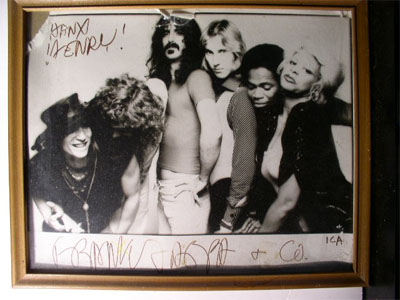
"Thanx, Henry [Goldrich]! Frank Zappa & Co. ICA"
[Terry Bozzio, Patrick O'Hearn, FZ, Eddie Jobson, Ray White, Bianca]
Jasun Martz
Wolfgang Fenchel, Neumusic Magazine, Berlin (from jasunmartz.com)
Jasun started composing The Pillory and assembling the Neoteric Orchestra in 1976. Following the premiere live performance in Los Angeles in July of that year, plans were initiated for the studio recording. However, when Jasun was asked by Frank Zappa to join his world-tour as a synthesizer programmer, the orchestra was temporarily disbanded and the album production delayed. After the Zappa tour in mid-77, Jasun moved to London to record some of the basic tracks and began auditions for the soon-to-be 40-piece orchestra.
Jasun Martz interviewed by Laura Thompson, FAQ Magazine (from jasunmartz.com)
As far as Zappa goes, I used to be a synthesizer programming wiz-kid and so I toured with him for a year or so. He had this HUGE synthesizer set up for Eddie Jobson that took me literally half a day just to tune. It was a great tour and Frank and I got along really well and I learned a lot from him. I recorded some interesting percussion and vocal overdubs for "Zappa, Live In New York".
After college, around 1977, I started touring as a roadie for lots of bands. Frank Zappa had this huge, and I mean huge Emu synth. It was like 10 feet tall and had literally hundreds of knobs and cables. By then I was a synthesizer wiz-kid and synthesizers were pretty new, so Frank hired me to run it, and Eddie Jobson to play it. I was excited to work with Eddie as he was an incredible musician, and we became really good friends touring with Zappa.
During the tour I started composing and recording THE PILLORY. It was a blend of all my musical tastes: prog, avant-garde, noise, freeform jazz with LOTS of mellotron. I owned 2 mellotrons at the time and have always loved the mellotron sound. Somehow the Neoteric Orchestra as I dubbed it, grew to 40 musicians including Jobson and Ruth Underwood from Zappas band. [...] It took me a few years to record it in LA, New York and London studios. Zappa was very supportive since he liked this type of music too. I have to admit, even though it was recorded 25 years ago, to me THE PILLORY still sounds pretty amazing.
[...] Frank and I got along really well and he showed me more about music than I learned in all my university music classes.
Art Rock: When you were in U.K., you appeared on Jasun Martz's The Pillory album. How did you get involved with Jasun's project?
Jobson: Jasun was my roadie in Frank Zappa band. He was keyboard tech. That album was done during Zappa. He wanted to make some kind of Avant-Garde record. He just asked me some favor if I would play something on his record. So I helped him out. I know that album still keeps coming out. People keep asking me what this album is.
Additional informant: Javier Marcote.
